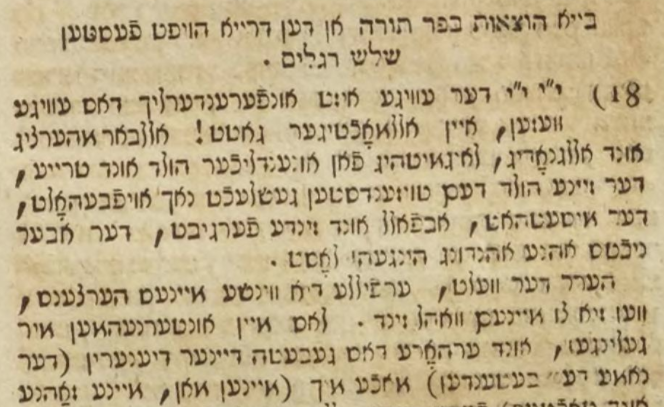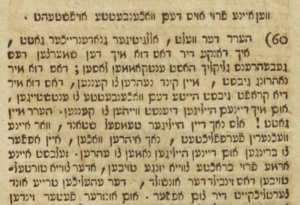TOGGLE COLUMNS (on/off):ADJUST COLUMN POSITIONS: select the column header cell and drag it where you want. show me!COPY INDIVIDUAL COLUMN(S): use CopyTables, a browser extension.
| Source (German) | Translation (English) |
|---|---|
Wenn eine Frau aus dem Wochenbette aufsteht. |
When a woman rises from her postpartum bed. |
Herr der Welt, allgütiger, gnadenreicher Gott, ich danke dir, daß du mich den Schmerzen des Gebärens hast glücklich entkommen lassen, daß du mir die Kraft giebst, heute dem Wochenbette zu entsteigen, um mich deinem heiligen Dienste weihen zu können. |
Lord of the world, all-good, merciful God, I thank you that you let me happily escape the pains of childbirth, that you give me the strength to get out of the maternity bed today in order to consecrate myself to your holy service. |
Herr mein Gott! als noch dein heiliger Tempel stand, war eine Wöchnerin verflichtet, nach ihren Wochen ein Opfer zu bringen um deinen heiligen Namen zu ehren. Selbst eine arme Frau brachte zwei junge Tauben oder zwei Turteltauben das Sinnbild der Unschuld, der ehelichen Treue und Zärtlichkeit, dir zum Opfer. Um unserer Väter Sünden willen aber ist Jerusalem zerstört, der Tempel verwüstet, und wir haben keinen Priester und keinen Altar mehr. Aber es heißt vielfach in der heiligen Schrift: Opfer und Gaben verlangst du nicht, du nimmst die Gesinnung unseres Herzens und die Worte unseres Mundes als Opfer an. — Nimm also, o allgütiger Gott, meinen Dank gütig auf, stärke mein Herz, daß ich die Vorsätze die ich während des Schmerzes meiner Niederkunft und meines Wochenbettes gefaßt habe, auch ausführe, daß ich stets in Liebe und Treue mit meinem Manne lebe, und die Kinder, die du uns schenkst zur Frömmigkeit und zu allgemeiner Menschenliebe erziehen helfe. |
Lord my God, when your holy temple still stood, a woman was obliged to make a sacrifice in the weeks after her childbirth in order to honor your holy name. Even a poor woman brought two young doves or two turtle doves, the symbol of innocence, conjugal fidelity and tenderness, as an offering to you.[1] Leviticus 12:1-8. But for the sins of our fathers, Jerusalem is destroyed, the Temple is desolate, and we no longer have a priest or an altar. But it is said many times in the holy scriptures: You do not demand sacrifices and offerings, you accept the attitude of our heart and the words of our mouth as a sacrifice.[2] Cf. Psalms 51:18-19. — Therefore, O all-good God, receive my thanks graciously, strengthen my heart that I may carry out the resolutions I made during the pain of my confinement and my puerperium, that I may always live in love and faithfulness with my husband, and that I may help to educate the children you give us to piety and to a general love of mankind. |
Herr, segne uns und behüte uns, gieb uns Kraft, nach deinen Gesetzen zu leben, daß es von unsern Kindern heiße: Dein Volk ist allesammt gerecht, ewig werden sie das himmlische Reich besitzen, ein Elysium meiner Pflanzung, meiner Händewerk zum Ruhm. Amen. |
Lord, bless us and protect us, give us strength to live according to your laws, so that it may be said of our children: Your people are all righteous, eternally they will possess the heavenly kingdom, an Elysium of my planting, of my handiwork for glory.[3] Cf. Isaiah 60:21. Amen. |
“Wenn eine Frau aus dem Wochenbette aufsteht” was translated/adapted by Yehoshua Heshil Miro and published in his anthology of teḥinot, בית יעקב (Beit Yaaqov) Allgemeines Gebetbuch für gebildete Frauen mosaischer Religion. It first appears in the 1829 edition, תחנות Teḥinot ein Gebetbuch für gebildete Frauenzimmer mosaischer Religion as teḥinah №60 on pp. 86-87. In the 1835 edition, it appears as teḥinah №62 on pp. 109-110. In the 1842 edition, it appears as teḥinah №65 on pp. 114-115.
We welcome corrections and improvements. The transcription of the German from Latin script in Fraktur type provided machine-readable text for a machine translation by DeepL, which we then edited for accuracy and clarity. –Aharon Varady
Source(s)



“Wenn eine Frau aus dem Wochenbette aufsteht | When a woman rises from her postpartum bed, a teḥinah by Yehoshua Heshil Miro (1829)” is shared through the Open Siddur Project with a Creative Commons Attribution-ShareAlike 4.0 International copyleft license.










Comments, Corrections, and Queries